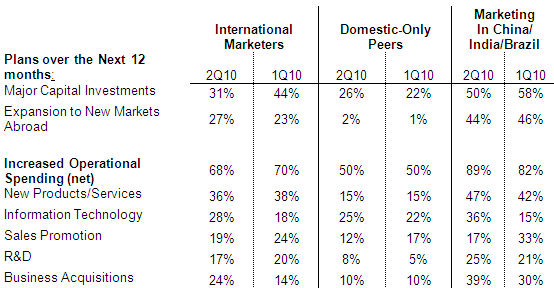This past quarter, only 45 percent of the nation's leading private company executives surveyed for PricewaterhouseCoopers' Private Company Trendsetter Barometer voiced optimism about U.S. economic growth over the next 12 months — six points below the previous quarter’s 51%, though 11 points higher than a year ago. Private companies with international operations remained slightly more optimistic about U.S. economic growth than their domestic-only counterparts, 46% and 44%, respectively. As for optimism about the global economy, international marketers' confidence dropped to 37%, down 10 points from last quarter's 47% but above last year’s 30%.
Despite an increased sense of uncertainty, more than three quarters (76%) of leading private companies expect positive revenue growth for their businesses over the next 12 months, with 38% anticipating double-digit growth and 38% expecting single-digit growth. Only 12% forecast negative revenue growth, while just 14% forecast zero growth. Trendsetter CEOs are now forecasting an average 9.1% growth for their own companies’ revenue over the next 12 months, down a point from last quarter’s 10% forecast.
“Although we continue to emerge from the downturn, political and economic uncertainty may linger for some time,” says Ken Esch, a partner with PricewaterhouseCoopers’ Private Company Services practice. “That uncertainty isn’t keeping Trendsetter CEOs from pursuing growth opportunities, but it does reinforce the need to carefully manage against ongoing market and regulatory risks.”
More concern about taxation and regulatory pressure adds to growth barriers
In keeping with increased uncertainty in the market, concern about lack of demand continues to be the main potential barrier to growth — cited by 78% of respondents (up four points from the previous quarter).
Concerns over increased taxation (52%, up seven points from the previous quarter) and legislative/regulatory pressures (50%, up two points from the previous quarter) were cited by more Trendsetter CEOs this quarter, in line with increased uncertainty about global and US economic performance and governmental policies.
“Private company CEOs are keeping a close eye on how state, federal, and foreign governments continue to deal with the downturn," notes Esch. "As various new tax and economic policies begin to play out here and around the globe, US companies will be trying to gauge how those are affecting the markets and, in turn, impacting new business prospects.”
Gross margins up, despite pricing limitations
Gross margins continued to improve in the second quarter — with 30% of survey panelists reporting higher margins, and 22% reporting lower margins, for a net of plus 8% (up four points from the previous quarter). Costs and prices were stable. While costs decreased for net 1% of Trendsetter CEOs, prices also decreased for net 2% of respondents.
“Trendsetter CEOs continue to experience a challenging pricing environment for goods and services due to economic pressure at home and abroad," says Esch. "However, private companies are clearly doing a good job of managing costs to maintain profitability. That should give them a solid platform as they continue working to grow revenue."
Majority plan to hire new employees
Looking ahead, 54% of survey panelists plan to add employees to their workforce over the next 12 months. This is similar to the previous quarter’s 53% and well above last year’s 34%. Only 2% plan to reduce their workforce, and 44 % will keep their hiring levels relatively the same. An overall increase of 1.8% is planned for the panel’s composite workforce, up slightly from 1.5% last quarter and up from 1.4% a year ago. Most of the increase in prospective hiring is among small private businesses, which added 5.8% to their composite workforce versus 1.5% for large private businesses.
“We’re seeing a lot of mixed analysis on jobs data," says Esch, "but what most people agree on is that the smaller private companies will lead the way in new hiring. Where these businesses had been making personnel cuts in recent years, they are now starting to spend again. For instance, in a downturn, sales and marketing departments typically undergo spending reductions — what we're seeing in this latest Trendsetter data is that private company CEOs are now increasingly looking to hire in this area. This reconfirms that there’s a real hunt for revenue in the marketplace.”
Capital investments down, but operational spending expected to rise
The number of private companies planning major capital investments over the next 12 months fell to 29% in the second quarter of 2010, down from last quarter's 32%. However, marketers doing business abroad — especially the 30% that are selling in China, India, and Brazil — remain ahead of their domestic-only peers in prospective spending over the next 12 months (50%). Overall, 31% of international marketers and 26% of domestic-only companies plan to increase capital spending. Operational spending plans for the next 12 months remain high at 58%, led by new product or service introductions (25%) and information technology (26%).
The breakout of spending by international versus domestic-only marketers is shown below:

“The big picture we’re seeing," says Esch, "is an overall increase in market complexities, both domestically and internationally, which is contributing to the rising uncertainty among Trendsetter CEOs. Continued investment in their businesses, however, signals that private company executives want to ensure they're poised to take advantage of opportunities once the economic, regulatory, and legislative scenarios come into better focus."




